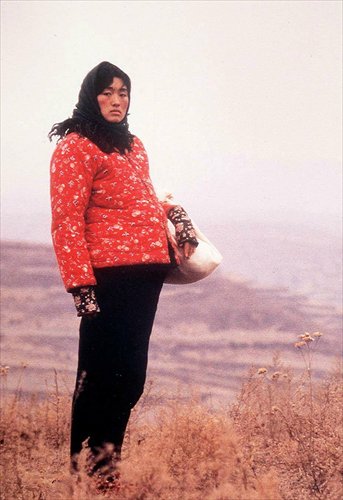HOME >> ARTS
China’s first dialect film festival looks to restore rural culture
By Lu Qianwen Source:Global Times Published: 2016-1-18 17:13:01

The Story of Qiu Ju Photo: IC
The prevalent use of the Beijing-dialect in the critically acclaimed film Mr. Six impressed audiences when it hit theaters. A highlight of the film, the use of a local dialect didn't just add to the personality of the main character, but also reminded audiences of the uniqueness of a generation of Beijingers. In another highly praised film, A Fool, the protagonists' use of a Northwest China dialect helped highlight local culture and conventions.
Luckily for dialects in China's northern regions, they have been relatively well preserved compared to southern dialects thanks to the former's relative easiness to be understood by those who speak Putonghua (standard Chinese). Many dialects in South China are slowly vanishing due to poor dissemination across the country and decreasing usage by young people who move to big cities.
It seems that as these dialects continue to fade, the attachment to them among China's older generations only becomes stronger.
"Fewer people speak it now, but for me it's a feeling of being in touch with your roots," said Chen Yu. Coming from the small southern village of Zurong in Guangdong Province, Chen is the sponsor behind the first dialect film festival in China.
"I still remember my excitement whenever the annual list of top Cantonese songs was released back when I was young," Chen said at a press conference in Beijing for the Zurong Dialect Film Festival on Sunday.
Fading culture
A lively example of the cultural diversity that exists in China across different regions, dialects are an important part of the country's intangible cultural heritage. To preserve this valuable part of culture, the State Language Commission has established databases covering different local dialects, while many areas such as Beijing, Shanghai and Zhejiang Province have established museums dedicated to local dialects.
However, despite these efforts, many dialects are still quickly fading away as migration from rural to urban areas in China continues. Even in the northern parts of China some dialects, like those spoken in Shanxi Province, are used much less frequently by younger generations as they have grown more accustomed to speaking Putonghua and see dialects as too rustic.
Compared to big cities where Putonghua holds sway, rural villages and towns are places where dialects still have a home. This is the main reason why Zurong Village was chosen to host the dialect film festival, according to Qin Xiaoyu, the president of the Zurong Dialect Film Festival. Qin is known for his documentary The Verse of Us, which delves into the lives of a group of migrant workers and features a number of dialects.
"In this era, we have actually turned into a new generation of nomads who have drifted away and gradually forgot the voices of our hometowns," Qin said at the press conference.

Stills from Mountains May Depart Photo: IC
In the spotlight
Providing a feeling of authenticity is the role most dialects play in films. However, with the emergence of dialect films, dialects are becoming an irreplaceable means to shape a character or create a setting.
Hong Kong films in Cantonese prevailed during the 1980s and 1990s. These films helped spread Cantonese across the country. Even today, some non-Cantonese moviegoers can still speak a word or two of the dialect.
In 1992, Zhang Yimou's breakout film The Story of Qiu Ju, which starred Gong Li as a young woman from a small village in Northwest China, captured the attention of audiences thanks to Gong's excellent portrayal of this rural woman, down to her accent and facial expressions.
However, there aren't nearly enough quality dialect films like The Story of Qiu Ju.
Fortunately some TV series filmed in certain dialects have earned unexpected warm welcomes from audiences, such as the My Own Swordsman (Shaanxi dialect), Loquacious Zhang Damin's Happy Life (Tianjin) and Countryside Love Stories.
The rising popularity of director Jia Zhangke's films in recent years holds increasing promise for dialects in film. The Fenyang dialect, used in some areas within Shanxi Province, is often spoken in his films. In his latest film, Mountains May Depart, the dialect doesn't just underscore the characters' personality and their environment, but plays a meaningful role in representing the estrangement of a family.
Rebuilding village culture
For many Chinese who live outside their hometowns, dialects are a constant reminder of where they come from. It is perhaps for this reason that CCTV's program Who Do You Think You Are has become such a hit since it premiered in 2014.
"Dialect films actually serve as a kind of local choreography," said film director Gao Qunshu, general counsel for the Zurong Dialect Film Festival.
"Throughout the country's history, the virtues of village culture have always been emphasized, but now it seems almost impossible to return our polluted and destitute hometowns to what they once were," said Gao.
Decades of rapid industrialization and massive migration have left many rural areas in China polluted and empty, while local folk traditions are being forgotten. The organizers of the festival hope that selected films will not only be able to inspire people to remember their hometown dialects, but also motivate them to re-establish the culture of their hometowns.
Newspaper headline: Local flavor
Posted in: Art